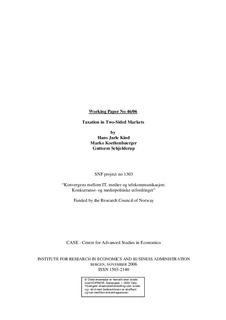| dc.contributor.author | Kind, Hans Jarle | |
| dc.contributor.author | Koethenbuerger, Marko | |
| dc.contributor.author | Schjelderup, Guttorm | |
| dc.date.accessioned | 2007-03-01T11:58:34Z | |
| dc.date.available | 2007-03-01T11:58:34Z | |
| dc.date.issued | 2006-11 | |
| dc.identifier.issn | 1503-2140 | |
| dc.identifier.uri | http://hdl.handle.net/11250/166088 | |
| dc.description.abstract | Two-sided platform firms serve distinct groups that are connected through interdependent demand, and include major businesses such as the media industry, banking, and the software industry. A well-known textbook result in one-sided markets is that a government may increase a monopolist’s outcome and reduce the deadweight loss by subsidizing output. The present paper shows that this result need not hold in a two-sided market. On the contrary, a higher ad-valorem tax rate – rather than a subsidy – could increase output and enhance welfare. | en |
| dc.language.iso | eng | en |
| dc.publisher | SNF | en |
| dc.relation.ispartofseries | Working paper | en |
| dc.relation.ispartofseries | 2006:46 | en |
| dc.subject | two-sided markets | en |
| dc.subject | ad-valorem taxes | en |
| dc.subject | specific taxes | en |
| dc.subject | imperfect competition | en |
| dc.subject | industrial organization | en |
| dc.title | Taxation in two-sided markets | en |
| dc.type | Working paper | en |
| dc.subject.nsi | VDP::Samfunnsvitenskap: 200::Økonomi: 210::Samfunnsøkonomi: 212 | en |
